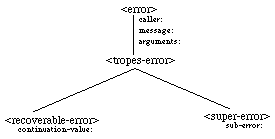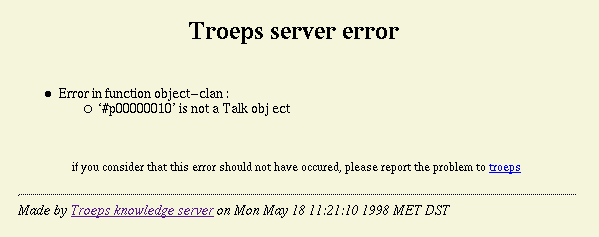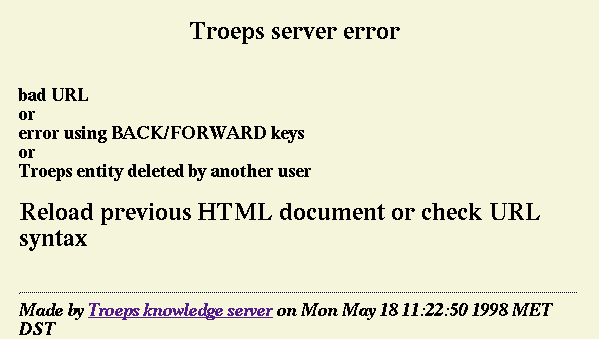Appendix
6. Error system
TROEPS
generates error messages which are Ilog
TALK
conditions. These messages are emitted through the
signal
primitive. Thus, if you want to catch errors in order to manipulate or display
them, you must trap these errors or design your own error handler. However, the
set of primitives described here is suited for almost every use.
Since
TROEPS
error system is based on
TALK
objects and generic functions, it is thus easily extendible through refinement.
Note
that this interface, unlike the
TROEPS
API, is made of a number of macro-functions.
Categories
of error
An
error or warning is a condition (see the
TALK
reference manual) whose class is a subclass of the
<troeps-error>
class. It thus shares the condition slots:
- the
error message associated to the class (
message);
- arguments
to be passed to the error printing function (
message-arguments);
- the
name of the function which raised the error (
caller);
Other
relevant slots of these objects are:
- a
possible sub-error (
sub-error);
- a
value for recovery purpose (
continuation-value).
All
these classes are subclasses of the leaves of the hierarchy below.

Figure
18: The hierarchy of errors in the
TROEPS
error system. It can be extended by the user.
Raising
errors
An
error can be raised by one of the error raising functions. They create the
corresponding error instance and signal it. Each error raising function differs
from the set of arguments to be provided (a sub-error or a continuation value).
- (troeps.error.raise-error
type
largs funnam
e) macro
in [libtrp]
Exit,
type
symbol,
largs
( sexp* ),
funname
symbol
- Signals
an error of type
type
with the corresponding message arguments
largs
during the call of function
funname.
- (troeps.error.raise-super-error
type
largs funname suberror
) macro
in [libtrp]
Exit,
type
symbol,
largs
( sexp* ),
funname
symbol,
suberror
error
- Signals
a super error of type
type
with the corresponding message arguments
largs
during the call of function
funname.
The error
suberror
is placed in the corresponding slot of the raised error.
- (troeps.error.raise-recup-error
type
largs funname value
) macro
in [libtrp]
Exit,
type
symbol,
largs
( sexp* ),
funname
symbol,
value
sexpr
- Signals
a recoverable error of type
type
with the corresponding message arguments
largs
during the call of function
funname.
The value
value
is the continuation value if one wishes to recover from the error.
- (troeps.error.raise-super-recup-error
type
largs funname suberror value
) macro
in [libtrp]
Exit,
type
symbol,
largs
( sexp* ),
funname
symbol,
suberror
error,
value
sexpr
- Signal
a super recoverable error of type
type
with the corresponding message arguments
largs
and the calling function
funname.
The error
suberror
is placed in the corresponding slot of the raised error and the value
value
is the continuation value if one wish to recover from the error.
Handling
errors
TROEPS
provides an error handler which prints the errors and does nothing else (i.e.
passes the control to the next handler). For recoverable errors, it prints the
error message and returns the continuation value to the program. This handler
is activated by calling:
? (add-handler (function troeps-handler))
This
handler can be replaced by another one. The revision system (see below) is
based on such a handler.
Trapping
errors
An
error can be trapped for any kind of treatment. A set of error trapping and
processing functions are available in order to process the error instance.
These functions usually evaluate some expressions and trap the possibly emitted
errors. When no error is raised, its value is returned, when an error is raised
a lambda-expression is used for processing the error message.
- (troeps.error.check
expr
type largs funname
) macro
in [libtrp]
->
expr,
expr
sexp,
type
symbol,
largs
( sexp* ),
funname
symbol
- Checks
the truth of the evaluation of
expr.
If
expr
is not satisfied, raises an error of type
type
with the corresponding
largs
and
funname.
- (troeps.error.encapsulate
expr
type largs funname
) macro
in [libtrp]
->
expr,
expr
sexp,
type
symbol,
largs
( sexp* ),
funname
symbol
- Encapsulates
the evaluation of
expr.
If an error is raised during its evaluation, it is trapped and introduced as a
sub-error in a new error of type
type
with corresponding
largs
and
funname.
This new error is raised in turn. If no error is raised during the evaluation of
expr,
the result of this evaluation is returned.
- (troeps.error.trap-error
expr
treatment
) macro
in [libtrp]
->
expr,
body
expr, treatment function
- Evaluates
expr
and returns the result of the evaluation. If an error is raised during this
evaluation, it is trapped and passed as the only argument of the
treatment
function which is processed in turn.
- (troeps.error.immediate
expr) macro
in [libtrp]
->
expr,
body
expr, treatment function
- Evaluates
expr
and returns the result of the evaluation. If an error is raised during this
evaluation, this error is trapped and passed as the only argument of the
tr-immediate-error-hook
method which is processed in turn. Note that no more error is raised
afterwards. Thus, if an error has to be propagated, this must occur in the body
of the
tr-immediate-error-hook
implementation.
- (tr-immediate-error-hook
error) generic
in [libtrp]
(tr-immediate-error-hook
error) method
in [libtrp]
->
expr,
error
error
- Proceeds
to a
print-error-stack
of the
error.
Printing
errors
An
error can be printed with the help of the
print-error
generic function. Any super-error printed by
print-error
only displays the outer error message. However, it is possible to print all the
embedded error messages with the help of the
print-error-stack
function.
- (troeps.error.print-error
error) generic
in [libtrp]
(troeps.error.print-error
error) method
in [libtrp]
->,
error
error
- Displays
the error message corresponding to the
error
on the standard error file (
stderr).
- (troeps.error.print-error-stack
error) generic
in [libtrp]
(troeps.error.print-error-stack
error) method
in [libtrp]
->,
error
error
- Same
as
print-error.
- (troeps.error.print-error-stack
error) method
in [libtrp]
->,
error
super-error
- Recursively
displays the stack of all errors in the sub-error slot of the
error
object
on the standard error file (
stderr).
Correcting
errors and revising assertions
When
some particular errors are triggered Troeps is able to help the user in
correcting these errors. The revision mechanism can guide the user through the
possible revision of the knowledge base (or the initial query) in order to
modify it in a consistent way. The revision system is available through the
graphic interface when the variable
*revision-p*
is evaluated to true.
Interface

Screendump
55: Simple error page.

Screendump
56: Non recognised object (or bad URL).
NIY
Screendump
57: Revision page when an inconsistency occurs.
NIY
Screendump
58: Further revision page.



